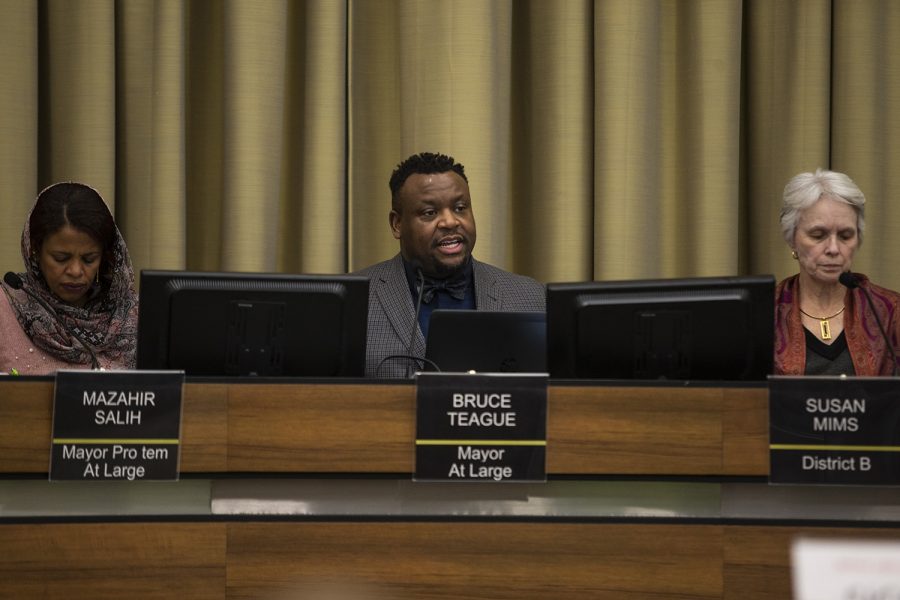Iowa City considers pilot program for late night, Sunday transportation services
The Iowa City City Council is considering a pilot program suggested by the Department of Transportation Services to bring late night and Sunday transportation services to the community.
Iowa City Mayor Bruce Teague addresses the crowd at an Iowa City City Council meeting on Tuesday, Feb. 18, 2020.
January 9, 2021
The Department of Transportation Services is likely to launch a self-funded pilot program that would offer late night and Sunday transit services.
Director of Transportation Services Darian Nagle-Gamm said at a city council budget work session on Saturday that the department will be considering altering current transportation routes and increasing the hours of transportation services for community members. An increase of hours would include the services on Sundays and a late night service, she said.
Nagle-Gamm said if funding is approved, the department would present plans for the pilot program to the city council in February or March.
She said the department was able to reduce the current number of routes using information from a fall 2020 transit study to simplify the system and prioritize higher frequency routes.
The current fiscal year 2021’s transit study will take longer to complete compared to years past because obstacles brought by COVID-19, Nagle-Gamm said, but the department is hoping that its transit study plan with the Iowa City Area Development group will be completed by August 2021.
She said this transit study will include suggestions as to how the department can best enhance the vehicles and improve rider experience.
During fiscal 2020, Nagle-Gamm said there were a reported 1.156 million passenger trips, which is a significant decrease, down 22 percent compared to fiscal 2019. She said while the public continues to endure the pandemic, there is an increased pressure to gain the trust of the community within the fields of ridership and transportation.
The new services would require additional funding, and the city council suggested either through reserve funding within the Department of Transportation Services or through local property taxes.
Fruin said there is currently reserve funding within the department of transportation services that would support this potential pilot program for at least a year.
“If we want to fund these systems and fund them with property taxes, we need to make that decision right now,” City Manager Geoff Fruin said.
He recommended that the Department of Transportation Services and the city council consider different pros and cons to providing a Sunday service and a late night service, and then make a concrete decision based on the feedback they receive.
City Councilor Susan Mims and Mayor Pro-Tem Mazahir Salih indicated they preferred a self-funding pilot program rather than using property taxes.
“I’d rather do the pilot and make sure we’re getting services in place that match what the community wants and what the community needs,” Mims said. “That way we can get the kind of ridership that makes sense to continue the services.”
Mims said the city should use the department’s reserve funding to carry this program for at least a year.
Based on the results from the pilot program, she said, the council will have the opportunity to budget through property tax revenue and decide if they want to ultimately use this revenue to fund the program.
Salih said she thinks the pilot will be beneficial in the sense that it will reveal if community members are in support of it and will use it year-round, even during winter months and on the weekends.
At this time, the entirety of the council is in agreement on this proposed pilot program using the department’s reserve funding to support it for a year, giving them substantial time to discuss the possibility of using property taxes to fund the continuation of the program if the public finds it beneficial.



